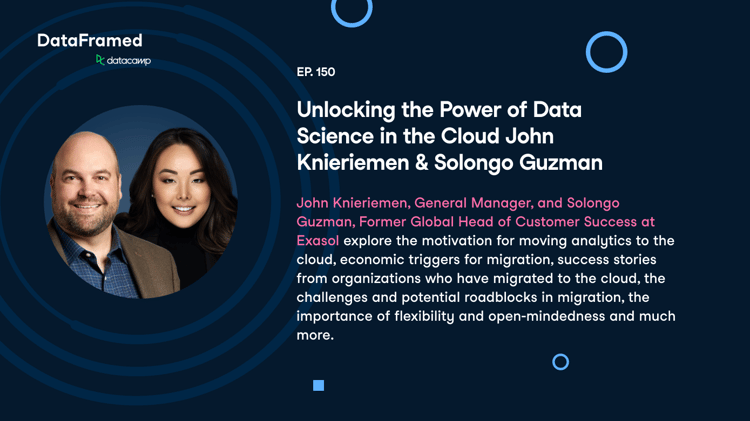Course
This tutorial is a valued contribution from our community and has been edited for clarity and accuracy by DataCamp.
Interested in sharing your own expertise? We’d love to hear from you! Feel free to submit your articles or ideas through our Community Contribution Form.
Most companies face the problem of using and processing enormous amounts of data. Computing services only sometimes have the technical capabilities to work with such scales. Cloud resources are available to facilitate various calculations and data analysis, which can greatly simplify the work of IT professionals and increase efficiency.
Benefits of Cloud Computing for Data Scientists
Google Cloud Platform (GCP) is an efficient cloud platform that can improve data management, reduce financial and human resources for infrastructure management, and enable network configuration. GCP features pay-as-you-go billing, so companies are charged only for the computing resources used during each billing cycle. This allows flexibility to scale usage up or down as needed. Access to the servers is maintained around the clock, and the platform is highly secure.
Thanks to this platform, data scientists can improve the management of their data warehouse and various systems. In addition, this service allows you to optimize and customize multiple computing processes as much as possible and create cloud solutions.
So, now we have clarified what GCP is, let's highlight the most important advantages of its use:
- A high degree of security, which is ensured by the creation of effective protection methods;
- Access to the global network – the largest in the world;
- Many services provide reliable data storage, as well as their processing to solve various problems of specialists;
- Reduction in financial costs – if we compare other cloud providers, this platform will cost 20-25% less – in general, using GCP allows the company to save more than 52% of costs;
- Saving the workload of the company's services by up to 80%; otherwise, overloads lead to software failures;
- The ability to select cloud configuration and memory is provided (savings of up to 50%).
In addition, using GCP provides artificial intelligence and strong analytical capabilities. Considering all these advantages, Google Cloud Platform can be viewed as a very effective tool for storing and processing vast amounts of data, allowing significant savings in costs and resources.
Types of Cloud Computing
Google Cloud Platform provides several options for cloud solutions, allowing you to select the most effective solution for your company optimally. Each option requires a different level of technical knowledge of data analysis. When choosing a cloud option, you should decide on the company's goals and desired results.
IaaS
Infrastructure as a service. The company has an infrastructure with the appropriate software, network cables, container storage, processors, and the necessary RAM. That is, technical equipment is provided for rent. The rest must be done on your own (administration) – setting up the network, installing the operating system, selecting a processor for the required load, and much more.
PaaS
Platform as a service. In this case, the company has a platform with a full-fledged environment that allows it to develop applications. The provider performs all technical selection (processor, RAM, storage, etc.).
SaaS
Software as a service. The provider offers various services with software that they also serve (including automatic updates). The provider fully manages the technical equipment and ensures security.
Google Cloud Core Components for Data Analysis
GCP includes several components, each of which has a specific purpose for data analysis:
- Compute calculations – will allow you to perform various calculations of any complexity, regardless of the amount of data used;
- Cloud: cloud storage with a database – ensures reliable safety of the data placed there;
- Management tools – allow you to monitor, log, generate error reports, trace, debug, and much more;
- Networking: virtual cloud network – domain system, content delivery network, interconnections, load balancing;
- BigData: big data;
- Cloud Machine: machine learning;
- Cloud development tools (repositories, endpoints, deployment);
- Security and identification.
This entire range of tools allows you to effectively process a vast amount of data and carry out processes of any complexity. Next, we'll take a closer look at the main components of the Google Cloud Platform.
BigQuery
As an IaaS-type cloud computing service, BigQuery provides storage, analysis, and management capabilities for vast volumes of data. This includes options for creating, deleting, and importing data. It is also possible to provide access to the data storage to third parties or a team of specialists. You can integrate stored data with various software. In addition, an option allows you to create and run machine learning. Users of this service are provided with 10GB of cloud storage and can perform up to one terabyte of requests monthly.
App Engine
PaaS-type cloud computing. This service allows you to develop and host web services and mobile applications. This system has a large functional management set, allowing for software scaling. In addition, a wide range of software API interfaces can interconnect different applications, allowing you to speed up product development.
Various programming languages support the service. Primary resources are provided free of charge for informational purposes only. In the case of a paid set, the user will pay solely for the volume used.
Compute Engine
IaaS-type cloud computing. Provides the ability to create and run cloud machines based on Google infrastructure. Access is provided through the interface. Other functionality includes point cloud machines and the ability to encrypt data and optimize resources through automated recommendations. The user is provided with one virtual machine for free use.
Kubernetes Engine
The primary purpose of this service is to work with applications with containers. Provides the ability to resize and deploy applications through an automated method. It also includes security features such as data encryption and container scanning to identify weak points. The service supports basic containerization technologies and hardware virtualization.
Cloud Storage
IaaS-type cloud computing. A cloud service in which the data has no structure. Includes the ability to resize the Google Virtual Cloud along with additional functionality. This service provides storage of up to five terabytes in containers with the assignment of individual keys. In addition, there is an opportunity to optimize data and reduce unnecessary data.
Datastore
Provides a scalable, non-relational database for applications. A set of options allows you to manage segmentation and synchronization in an automated way. This service is perfect for processing small-scale data.
Container Registry
It is a unified registry of containers that provides the ability to manage images, perform processes to detect vulnerabilities, and configure access. In this case, renting a virtual machine or finding disk space for the company is unnecessary.
All infrastructure and the required tools are presented as an utterly ready-made solution. You can work with containers through the control panel. This service gives developers fewer problems storing and deploying figurative containers. You can also integrate with CI/CD processes.
Cloud Functions
With this service, you can run applications in a secure environment that can scale without creating and maintaining cloud virtual machines. That is, the developed application will be launched on the company's server that provides this service, and there is no need to have its server run and test the application.
We have listed the most basic GCP services, but of course, there are several times more of them, not only for data processing and software development but also for creating a high level of security.
Google Cloud Use Cases
Here are a few examples of major companies that have used the GCP service to solve various software problems.
Spotify
Spotify offers a variety of music tracks and videos. This platform has more than 75 million subscribers and about 2 billion playlists. Thanks to such GCP services, it became possible to create a reliable infrastructure and increase the efficiency of the Spotify service. It is also possible to complete requests that previously took a day, but now everything happens in a few minutes. It allows you to optimize the service's performance with users.
X (Formerly Twitter)
The popular social network has about 330 million active users. Twitter is a repository of vast amounts of data and, through the use of GCP, has significantly improved the security of its platform and expanded its disaster recovery capabilities.
BestBuy
An international consumer electronics trading company with over 1,000 stores worldwide. In due time, they created their application using App Engine, allowing users to create their own wish list and share it with friends.
These and many other global companies were able to optimize the operation of their platforms, including Twitter, PayPal, eBay, and 20th Century Fox.
Conclusion
Google Cloud Platform is a primary cloud service provider that provides various computing and data processing services to enable analytics and process optimization. In addition, it is possible to use artificial intelligence and machine learning tools.
Thanks to GCP, companies will be able to develop while simultaneously saving significant funds and resources. GCP provides turnkey solutions for various needs, including infrastructure modernization, integration, and security. These services will be effective in many areas of company activity, especially in the work of data scientists.
To learn more about cloud computing, check out DataCamp’s Understanding Cloud Computing course today. If you're looking to prove your credentials, check out our guide on cloud certifications and how to prepare for them.

Google Cloud Platform Expert at Cloudfresh. Certified Google Cloud Digital Leader. Implemented hundreds of projects to deploy Google Cloud tools for business in various industries.

